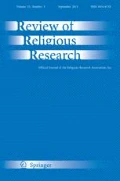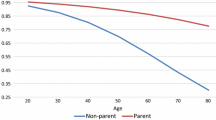Abstract
The purpose of this study is to see if there are differences in the social relationships that older African Americans, older whites, and older Mexican Americans form with the people where they worship. Data from two large surveys are pooled to see if race differences emerge in eleven different measures of church-based social relationships. These measures assess social relationships with rank-and-file church members as well as social relationships with members of the clergy. The findings reveal that older African Americans tend to have more well-developed social relationships in the church than either older whites or older Mexican Americans. This is true with respect to relationships with fellow church members as well as relationships with the clergy. In contrast, relatively few differences emerged between older Americans of European descent and older Mexican Americans. However, when differences emerged in the data, older whites tend to score higher on the support measures than older Mexican Americans.
Similar content being viewed by others
Notes
Some researchers have pointed out that standard errors derived from data that have been imputed with the EM procedure may be underestimated (e.g., Graham 2009). This means that some study findings may appear to be statistically significant even though this may not actually be the case. All analyses in this paper were re-estimated after list-wise deletion procedures were used to deal with item non-response. In no instance did a statistically significant relationship emerge from the imputed data but not from the data that were obtained with the list-wise deletion procedure. Moreover, in only one instance was a relationship estimated with the EM procedure (p = 0.029) more highly significant than the corresponding value that was estimated with list-wise deletion methods (p = 0.055). Given the fairly large number of significance tests that were conducted in this study, one might expect to get this type of result by chance alone.
The secular emotional support items were not administered until the second wave of interviews with older Americans of European descent and older African Americans. The analyses presented in the current study, therefore, compare secular support among older Mexican Americans at the baseline (and only) interview with Wave 2 reports of secular support by older whites and older African Americans.
The following instructions were read to study participants when the secular emotional support items were administered: “Now I have some questions about people who do not attend your church. I’m thinking here of family members and friends who do not worship in the church you go to.”
Mandas, or promesas, are a true religious quid pro quo whereby a Mexican American makes a solemn promise to the Virgin or one of the saints if the deity will grant a request. So, for example, they may promise to make a pilgrimage to a sacred shrine if the deity cures a loved one who is ill.
References
Baldwin, James M. 1902. Fragments in philosophy and science of being: Collected essays and addresses. New York: Charles Scribner’s Sons.
Bollen, Kenneth A. 1989. Structural equations with latent variables. New York: Wiley.
Carrasco, David. 1990. Religions of Mesoamerica: Cosmovision and ceremonial centers. Long Grove, IL: Waveland Press.
Dolan, Jay P., and Gilberto M. Hinojosa. 1994. Mexican Americans and the Catholic Church 1900–1965. South Bend, IN: University of Notre Dame Press.
Du Bois, W. E. B. 2000. Du Bois on Religion. ed. Phil Zuckerman. New York: Alta Mira Press.
Elizondo, Virgilio. 2000. Popular religion as support of identity. In Beyond borders: Writings of Virgilio Elizondo, friends, ed. Timothy Motivina, 126–132. Maryknoll, NY: Orbis Books.
Elizondo, Virgilio. 2010. Spiritual writings. Maryknoll, NY: Orbis Books.
Federal Interagency Forum on Age Related Statistics. 2008. Older Americans 2004: Key indicators of well-being. Washington, DC: U. S. Government Printing Office.
Fernandez, Eduardo C. 2007. Mexican American catholics. New York: Paulist Press.
Glock, Charles Y. 1964. The Role of deprivation in the origin and evolution of religious groups. In Religion and social conflict, ed. Robert Lee, and Martin E. Marty, 24–36. New York: Oxford University Press.
Goizueta, Roberto S. 2002. The symbolic world of Mexican American religion. In Horizons of the Sacred: Mexican traditions in U.S. Catholicism, ed. Timothy Matovina, and Gary Riebe-Estrella, 119–138. Ithaca, NY: Cornell University Press.
Graham, John W. 2009. Missing data analysis: Making it work in the real world. Annual Review of Psychology 60: 549–576.
Koenig, Harold G., Michael E. McCullough, and David B. Larson. 2001. Handbook of religion and health. New York: Oxford University Press.
Krause, Neal. 1997. Anticipated support, received support, and economic stress among older adults. Journal of Gerontology: Psychological Sciences 52B: P284–P293.
Krause, Neal. 2002a. Exploring race differences in a comprehensive battery of church-based social support measures. Review of Religious Research 44: 126–149.
Krause, Neal. 2002b. A comprehensive strategy for developing closed-ended survey items for use in studies of older adults. Journal of Gerontology: Social Sciences 57B: S263–S274.
Krause, Neal. 2006a. Church-based social support and mortality. Journal of Gerontology: Social Sciences 61B: S140–S146.
Krause, Neal. 2006b. Exploring race and sex differences in church involvement during late life. International Journal for the Psychology of Religion 16: 127–144.
Krause, Neal. 2008. Aging in the church: How social relationships affect health. Conshohocken, PA: Templeton Foundation Press.
Krause, Neal. 2010. Receiving social support at church when stressful life events arise: Do Catholics and Protestants differ? Psychology of Religion and Spirituality 2: 234–246.
Krause, Neal, and Elena Bastida. 2009. Religion, suffering, and health among older Mexican Americans. Journal of Aging Studies 23: 114–123.
Krause, Neal, and John Cairney. 2009. Close companion friends in church and health in late life. Review of Religious Research 51: 200–282.
Krause, Neal, Linda M. Chatters, Tina Meltzer, and David L. Morgan. 2000. Negative interaction in the church: Insights from focus groups with older adults. Review of Religious Research 41: 510–533.
Leon, Luis D. 2004. La Llorona’s children. Berkeley: University of California Press.
Markides, Kyriakos S. 2003. Hispanic established populations for the epidemiologic studies of the elderly 1993–1994. Study number 2851. Ann Arbor, MI: Inter-university Consortium for Political and Social Research.
Matovina, Timothy M. 1991. Liturgy and popular expression of faith: A look at the works of Virgil Elizondo. Worship 65: 436–444.
Maxim, Paul S. 1999. Quantitative research methods in the social sciences. New York: Oxford University Press.
Maynard-Reid, Pedrito U. 2000. Diverse worship: African-American, Caribbean & Hispanic perspectives. Downers Grove, IL: InterVarsity Press.
Mills, C.Wright. 1959. The sociological imagination. New York: Oxford University Press.
Nelsen, Hart M., and Anne K. Nelsen. 1975. Black church in the sixties. Lexington, KY: University of Kentucky Press.
Nunnally, Jum C., and Ira H. Bernstein. 1994. Psychometric theory, 3rd ed. New York: McGraw-Hill.
Pargament, Kenneth I. 1997. The psychology of religious coping: Theory, research, and practice. New York: Guilford.
Paris, Peter J. 1995. The spirituality of African peoples: The search for a common moral discourse. Minneapolis: Fortress Press.
Park, Crystal L. 2005. Religion and meaning. In Handbook of the psychology of religion and spirituality, ed. Ray F. Paloutzian, and Crystal L. Park, 295–314. New York: Guilford.
Roberts, J. Deotis. 2003. Black religion, black theology. Ed. David E. Goatley. Harrisburg, PA: Trinity Press International.
Rodriguez, Jeanette. 1994. Our lady of Guadalupe: Faith and empowerment among Mexican American women. Austin, TX: University of Texas Press.
Rook, Karen S. 1984. The negative side of social interaction: Impact on psychological well-being. Journal of Personality and Social Psychology 46: 1097–1108.
Schieman, Scott, Tetyana Pudrovska, Leonard I. Pearlin, and Christopher G. Ellison. 2006. The sense of divine control and psychological distress: Variations across race and socioeconomic status. Journal for the Scientific Study of Religion 45: 529–549.
Schleiermacher, Friedrich. 1799/1994. On religion: Speeches to its cultural despisers. Louisville, KY: John Knox Press.
Stark, Rodney, and William S. Bainbridge. 1987. A theory of religion. New Brunswick, NJ: Rutgers University Press.
Taylor, Robert J., Linda M. Chatters, and Jeffrey Levin. 2004. Religion in the lives of African Americans: Social, psychological, and health perspectives. Thousand Oaks, CA: Sage.
Worthington, Everett. 1998. Dimensions of forgiveness: Psychological research & theological perspectives. Philadelphia: Templeton Foundation Press.
Acknowledgments
This research was supported by grants from the National Institute on Aging (RO1 AG014749; RO1 AG026259) and a grant from the John Templeton Foundation that was administered through the Center for Spirituality, Theology, and Health, at Duke University.
Author information
Authors and Affiliations
Corresponding author
Rights and permissions
About this article
Cite this article
Krause, N., Bastida, E. Social Relationships in the Church During Late Life: Assessing Differences Between African Americans, Whites, and Mexican Americans. Rev Relig Res 53, 41–63 (2011). https://doi.org/10.1007/s13644-011-0008-3
Received:
Accepted:
Published:
Issue Date:
DOI: https://doi.org/10.1007/s13644-011-0008-3




